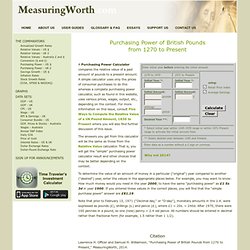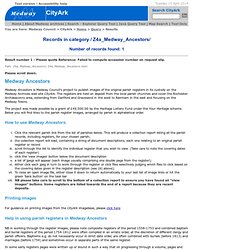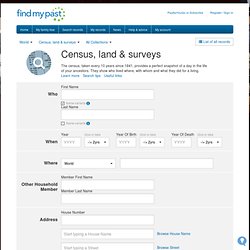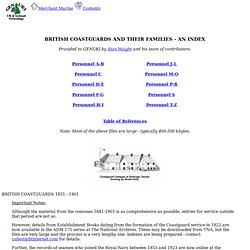

Measuring Worth - Measures of worth, inflation rates, saving calculator, relative value, worth of a dollar, worth of a pound, purchasing power, gold prices, GDP, history of wages, average wage. Purchasing Power of British Pounds from 1270 to Present A Purchasing Power Calculator compares the relative value of a past amount of pounds to a present amount.

A simple calculator uses only the prices of consumer purchases to do this whereas a complete purchasing power calculator, such as found in this website, uses various prices, wages, output, etc., depending on the context. For more information on this issue, consult Five Ways to Compute the Relative Value of a UK Pound Amount, 1830 to Present where you will also find further discussion of this issue. The answers you get from this calculator will be the same as those from the Relative Value calculator. CWGC - Homepage. Calculator: Add to or subtract from a date. The history of the workhouse by Peter Higginbotham.
London Lives 1690 to 1800 ~ Crime, Poverty and Social Policy in the Metropolis. CuriousFox UK genealogy message boards - villages, towns, local history, UK maps. Historical Directories. UK Online Parish Clerks. Cityark - Search Results. Please scroll down.

Medway Ancestors is Medway Council's project to publish images of the original parish registers in its custody on the Medway Archives web site CityArk. The registers are held on deposit from the local parish churches and cover the Rochester Archdeaconry area, extending from Dartford and Gravesend in the west to Rainham in the east and focusing on the Medway Towns. The project was made possible by a grant of £49,500.00 by the Heritage Lottery Fund under the Your Heritage scheme. Below you will find links to the parish register images, arranged by parish in alphabetical order. How to use Medway Ancestors. Click the relevant parish link from the list of parishes below. Printing images For guidance on printing images from the CityArk imagebase, please click here Help in using parish registers in Medway Ancestors In some early registers pages were written up or bound in such a way that on progressing through a volume, pages and entries appear upside down.
Parish maps. 1841 - 1911 census records. As with any family history records, original census returns are not free from mistakes; you should therefore keep an open mind when using the data and not believe everything you read.

Some common errors that can be found in census returns are as follows: Errors in recording census data As illiteracy was quite high in the 19th century, many people may have asked their friends, neighbours or even the enumerators to help fill out the forms. In institutions or on vessels it was the person in charge of the prison or ship who completed the details on behalf of everyone in the institution or on the ship. This led to many errors in note taking and in recording the final information. Typical mistakes were made when spelling peoples’ names, or noting their occupations, or even when recording their ages. Age discrepancies Whilst enumerators and the officials at institutions made mistakes when recording information, individuals who completed the forms themselves also made some errors. Name changing. British Coastguards 1841-1891. Merchant Marine Contents Provided to GENUKI by Stan Waight and his team of contributors.

Table of References Note: Most of the above files are large - typically 400-500 kbytes. Important Notes: Although the material from the censuses 1841-1901 is as comprehensive as possible, entries for service outside that period are not so. However, details from Establishment Books dating from the formation of the Coastguard service in 1822 are now available in the ADM 175 series at The National Archives.